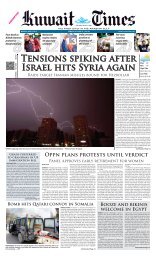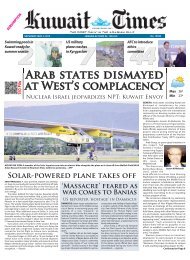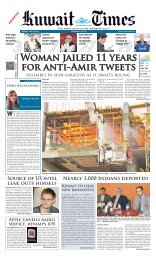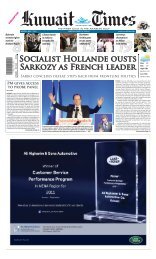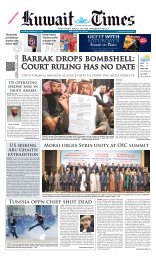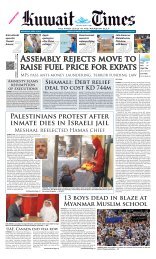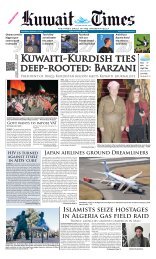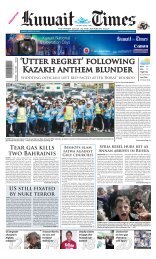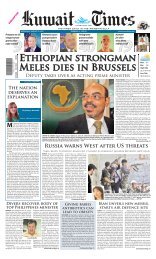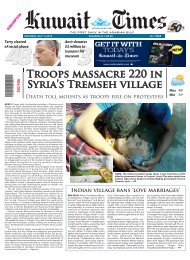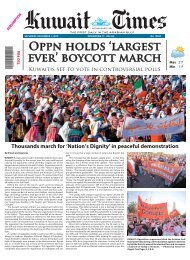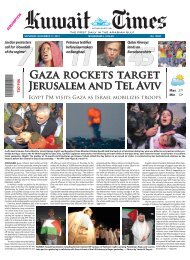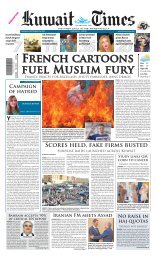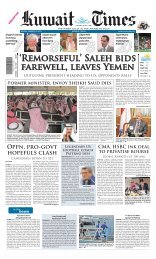NEw SARS-likE viRUS EMERGES iN MidEASt - Kuwait Times
NEw SARS-likE viRUS EMERGES iN MidEASt - Kuwait Times
NEw SARS-likE viRUS EMERGES iN MidEASt - Kuwait Times
Create successful ePaper yourself
Turn your PDF publications into a flip-book with our unique Google optimized e-Paper software.
Obama ignores Israel ‘noise’ on Iran nukes<br />
Continued from Page 1<br />
purposes, but the West fears it is for building nuclear<br />
weapons. Israel is seen as pushing a much more hardline<br />
approach that would include military action, while<br />
Washington instead prefers to let diplomacy and sanctions<br />
dissuade Iran from building the bomb.<br />
Obama, interviewed for Sunday’s edition of “60<br />
Minutes” on broadcaster CBS, said he understands and<br />
agrees with Netanyahu’s insistence that Iran not be<br />
allowed to obtain nuclear weapons as this would threaten<br />
both countries, the world in general, and kick off an<br />
arms race. But Obama added: “When it comes to our<br />
national security decisions - any pressure that I feel is simply<br />
to do what’s right for the American people. And I am<br />
going to block out - any noise that’s out there.”<br />
Tensions have been running high between the United<br />
States and Israeli leader, and they will not hold a face-toface<br />
meeting this week at the UN General Assembly in<br />
New York. The White House has cited scheduling problems.<br />
Obama’s contender for the presidency, Republican<br />
Mitt Romney, said this was no way to treat an ally. The<br />
decision not to meet with Netanyahu, he said, also in an<br />
interview with “60 Minutes”, “is a mistake and sends a<br />
message throughout the Middle East that somehow we<br />
distance ourselves from our friends and I think the exact<br />
opposite approach is what’s necessary.”<br />
Romney campaign spokeswoman Andrea Saul argued<br />
that Obama’s reference to Israel as “one of our closest<br />
allies in the region” was unacceptable. “This is just the latest<br />
evidence of his chronic disregard for the security of<br />
our closest ally in the Middle East,” she said. “Romney<br />
strongly believes that Israel is our most important ally in<br />
the Middle East and ...as president, Governor Romney will<br />
restore and protect the close alliance between our nation<br />
and the state of Israel.”<br />
Separately, a UN report published yesterday said Israel<br />
Continued from Page 1<br />
spokesman said those accused of “terrorism-related”<br />
crimes were undergoing fair judicial process. “As for the<br />
gathering of a limited number of relatives of the<br />
detained people at a prison, they have been stopped<br />
according to legal procedures and will be dealt with if<br />
they are found in violation of the laws,” the spokesman<br />
said.<br />
Activists said police with shields and batons persuaded<br />
the protesters at the prison to go home, telling them<br />
their message had been heard and their demands<br />
would be looked into.“When we left the ‘Emergency<br />
Forces’ followed our cars. They chased us and stopped<br />
us to detain the men,” said Reema Al-Juraish, an activist<br />
whose husband, a nurse, is in the prison. “I saw them<br />
grab five and when I tried to intervene they pushed me<br />
and hit me with a baton.” She said up to 60 men were<br />
arrested and taken to an unknown location. “The kingdom<br />
is celebrating national day even as our husbands<br />
are being held without charges and without trial,”<br />
Juraish told AFP by telephone. She said her husband<br />
“has been detained for more than nine years without<br />
charge,” adding that she has not seen him in “eight<br />
months”.<br />
Another protester who asked not to be named said<br />
her brother was sentenced to three years in prison and<br />
“has served his sentence but remains in jail”. Her other<br />
brother, who was also detained by authorities, “died in<br />
custody due to lack of care”, she said, adding that both<br />
her brothers were arrested for their “religious beliefs”.<br />
Rights activists told AFP that most of the detainees in<br />
question were “political prisoners with radical religious<br />
beliefs”. More than 100 people, including women and<br />
children, had staged a two-day protest in the desert<br />
around Tarfiya prison in the Qassim province but were<br />
Free speech ‘red lines’ feed Muslim film...<br />
Continued from Page 1<br />
Beyond the rage, bloodshed and death threats -<br />
churning now for two weeks is a quandary for American<br />
policymakers that will linger long after the latest mayhem<br />
fades: How to explain the US embrace of free<br />
expression to an Islamic world that increasingly sees<br />
only double standards? Although there are many<br />
nuances - including strict US laws when hate speech<br />
crossed the line into threats or intimidation - they are<br />
mostly lost in the current outrage that included a<br />
peaceful march in Nigeria yesterday and Iran threatening<br />
to boycott the 2013 Academy Awards after the<br />
country’s first Oscar-winning film this year.<br />
With each protest, many clerics and Islamist hardliners<br />
hammer home the narrow view that America is<br />
more concerned with political correctness or safeguarding<br />
children from sexual content than the religious sensibilities<br />
of Muslims. In Gaza, preacher Sheikh Hisham<br />
Akram said tolerance is the goal, but the “red line” is<br />
crossed with “anyone who insults our religion.” Iran’s<br />
President Mahmoud Ahmadinejad - now in New York<br />
for the UN’s annual General Assembly - denounced last<br />
week the “deception” of US laws protecting rights while<br />
allowing the clip from the film “Innocence of Muslims”.<br />
“In some extent, it’s not an issue of condemning<br />
America’s freedom of speech. It’s become an issue, in<br />
the eyes of many Muslims, over where the lines are and<br />
why they are not protecting the feelings of Muslims,”<br />
said John Voll, associate director of the Center for<br />
Muslim-Christian Understanding at Georgetown<br />
University in Washington. It also turns the $70,000 US<br />
ad initiative in Pakistan - one of the hotbeds of the<br />
protests - into a major challenge to gain any ground.<br />
Besides Obama, the spots include Secretary of State<br />
Hillary Rodham Clinton repeating that US authorities<br />
had no connection to the video.<br />
It’s part of wider US strategies to use social media<br />
and other forums to reach out to moderates in the<br />
Islamic world - including what the State Department<br />
has described as a “virtual embassy” for Iranian web<br />
surfers. But the fallout from the film has so far drowned<br />
out appeals for calmer dialogue in places such as<br />
Pakistan, where at least 23 people have died in unrest<br />
linked to the film. “The fact that (the Obama administration)<br />
is trying to step up to the plate and trying to<br />
engage where the debate is really happening should be<br />
commended,” said Daniel Markey, a senior fellow in<br />
South Asian affairs at the Council on Foreign Relations.<br />
“But what credibility do they have to deliver this message?<br />
That’s a different story. ... It’s unlikely to make the<br />
sale on the Pakistani street.”<br />
At the UN, a separate effort is being spearheaded by<br />
Ekmeleddin Ihsanoglu, secretary-general of the<br />
Organization of Islamic Cooperation. He said the film<br />
will be at the top of the agenda of a meeting of the 57-<br />
must do more to halt a string of serious violations of<br />
Palestinian human rights documented by a 2009 factfinding<br />
mission. There is a “need to more earnestly pursue<br />
accountability for the serious violations of human<br />
rights and international humanitarian law that were documented<br />
by the fact-finding mission,” Deputy High<br />
Commissioner for Human Rights Kyung-wha Kang told<br />
the UN Human Rights Council in Geneva. Speaking on<br />
behalf of UN rights chief Navi Pillay, she presented a<br />
report on progress made in implementing recommendations<br />
in the UN Goldstone report, which detailed violations<br />
of international rights and humanitarian laws in<br />
connection with the 2008/09 Gaza conflict.<br />
“It has been nearly three years since this council<br />
endorsed the fact-finding mission’s recommendations.<br />
Yet, not one person has been indicted for any of the incidents<br />
documented,” she said. “Respecting human rights<br />
and international humanitarian law obligations means<br />
that perpetrators of violations are brought to justice.”<br />
Penalties must also correspond to the crimes, she said,<br />
decrying the case of an Israeli soldier sentenced last<br />
month to just 45 days in prison for killing two unarmed<br />
Palestinian women waving a white flag during the Gaza<br />
conflict.<br />
Israel’s Operation Cast Lead offensive in Gaza claimed<br />
the lives of some 1,400 Palestinians -more than half of<br />
them civilians - and 13 Israelis, including three civilians<br />
and 10 soldiers. Yesterday’s report by UN chief Ban Kimoon<br />
also highlighted border closures and restrictions<br />
on Gaza, and obstacles to movement in the West Bank,<br />
exacerbating a deep economic crisis in the Palestinian<br />
territories. It also spoke out against the detention of<br />
4,500 Palestinians in Israeli jails, noting that 250 were also<br />
being held in so-called administrative detention, without<br />
trial. The report also criticised Palestinian armed groups<br />
for firing rockets at Israel, and Palestinian authorities for<br />
among other things arbitrary arrests. — Agencies<br />
Dozens held after Saudi jail protest<br />
surrounded by police. They said they had been kept<br />
without food or water for almost a full day. Police set up<br />
checkpoints on the two roads leading to the area and<br />
deployed patrols in the desert around it, they said.<br />
The kingdom, which has almost no elected bodies,<br />
avoided the kind of unrest that toppled leaders across<br />
the Arab world last year after it introduced generous<br />
social spending packages and issued a religious edict<br />
banning public demonstrations. King Abdullah has<br />
pushed through some economic and social reforms,<br />
including cautious moves to improve the position of<br />
women and religious minorities, but he has left the<br />
political system untouched.<br />
The world’s top oil exporter is an important ally of<br />
Western countries in battling Al-Qaeda, which carried<br />
out a campaign of attacks in the kingdom from 2003-06.<br />
Last year the Interior Ministry said it had put on trial<br />
5,080 of nearly 5,700 people it had detained on security<br />
grounds. In April, a court in Riyadh sentenced rights<br />
campaigner Mohammed Al-Bajadi to four years in<br />
prison after he was accused of forming a human rights<br />
association, tarnishing Saudi Arabia’s reputation, questioning<br />
the independence of the judiciary, and owning<br />
illegal books, activists said. He had been held for a year<br />
without charges after voicing support for prisoners’<br />
families.<br />
In a separate gathering yesterday, dozens of protesters<br />
rallied in front of the government-linked Saudi<br />
Human Rights Commission also calling for the release of<br />
jailed relatives. “There are some prisoners who have<br />
been tortured, some who have completed their sentences,<br />
others who have not been charged and even<br />
some who have been found innocent but are still<br />
imprisoned. We will stay here until we are heard,” said<br />
one protester who declined to be named. Saudi Arabia<br />
denies torturing prisoners. — Agencies<br />
member group on the sidelines of the General<br />
Assembly. Among the proposals is a call to impose an<br />
international law against promoting religious hatred.<br />
Such appeals could get widespread support, but are<br />
nearly certain to collide with Western free speech codes<br />
and be rendered difficult to enforce in the borderless<br />
world of the web.<br />
Already, many moderate Muslim scholars and leaders<br />
have urged the UN or other international bodies to step<br />
in to help define possible global standards on religious<br />
expression. Paul Bhatti, an adviser to the Pakistani prime<br />
minister, told a multi-faith crowd of Muslims, Christians<br />
and others outside the country’s parliament Sunday<br />
that international laws should be imposed to limit the<br />
most hateful fringes of Western free speech. But just a<br />
day earlier, a Pakistan government minister offered a<br />
$100,000 bounty for the death of the filmmaker.<br />
The two responses - one appealing for a higher law<br />
and the other taking justice into his own hands - frame<br />
another divide pried wider by the latest chaos: How<br />
much leeway can Muslim countries allow for expressions<br />
of anger against their faith? While many Muslims<br />
believe American protections for open expression were<br />
abused by the film, there are also moderate voices in<br />
the Islamic world questioning whether the defense of<br />
their religion is warped by death threats and violence<br />
that has left dozens dead, including the US ambassador<br />
to Libya. “This is the flip side to the criticism against<br />
American free speech,” Voll said. “This is another major<br />
learning opportunity inside Muslim societies to look at<br />
themselves and interactions with the world. We have<br />
been here before.”<br />
But the latest upheavals appear to resonate even<br />
deeper because of the widening reach of the web and<br />
social media, which also have played a central role in<br />
the Arab Spring uprisings that have opened new political<br />
space for hardline Islamists. “Sadly, the voices of reason<br />
and logic in this part of the world are few,” said<br />
Ebtehal Al-Khateeb, a <strong>Kuwait</strong> University professor and<br />
human rights activist. “Even those who strongly oppose<br />
the violence prefer not to speak.”<br />
<strong>Kuwait</strong> is a particularly instructive proving ground in<br />
the struggle to clarify an Islamic version of free speech.<br />
After Islamist-led opposition groups gained control of<br />
parliament in February, they tried to push through<br />
measures that included the death penalty for blasphemy<br />
against Islam. <strong>Kuwait</strong>’s Western-leaning rulers signaled<br />
they would reject the move and later suspended<br />
the parliament over election law technicalities. “The<br />
truth is that as amateurish movie production is, it still<br />
falls in the category of freedom of speech,” Khateeb<br />
said. “If you say that to people here, they will read your<br />
response as: ‘You accept this. You are a blasphemer.’<br />
They still don’t understand that they don’t have to<br />
accept it. They can oppose it, but in a civil manner that<br />
is more constructive.” — AP<br />
NEWS<br />
Ahmadinejad blasts Israel<br />
Continued from Page 1<br />
Israeli Prime Minister Benjamin Netanyahu has hinted<br />
Israel could strike Iran’s nuclear sites and has criticized<br />
US President Barack Obama’s position that sanctions<br />
and diplomacy should be given more time to stop<br />
Iran from acquiring nuclear weapons. Iran denies that it<br />
is seeking nuclear arms and says its atomic work is<br />
peaceful, aimed at generating electricity.<br />
“Fundamentally we do not take seriously the threats of<br />
the Zionists. ... We have all the defensive means at our<br />
disposal and we are ready to defend ourselves,”<br />
Ahmadinejad said. He is in New York to attend the UN<br />
General Assembly. His speech is scheduled for tomorrow.<br />
On Sunday, UN Secretary-General Ban Ki-moon met<br />
with Ahmadinejad and warned him of the dangers of<br />
incendiary rhetoric in the Middle East. Ahmadinejad<br />
did not heed the warning. Ahmadinejad alluded to his<br />
previous rejection of Israel’s right to exist. “Iran has<br />
been around for the last seven, 10 thousand years. They<br />
(the Israelis) have been occupying those territories for<br />
the last 60 to 70 years, with the support and force of<br />
the Westerners. They have no roots there in history,” he<br />
said, speaking to reporters through an interpreter. The<br />
modern state of Israel was founded in 1948.<br />
“We do believe that they have found themselves at a<br />
dead end and they are seeking new adventures in<br />
order to escape this dead end. Iran will not be damaged<br />
with foreign bombs,” Ahmadinejad said, referring<br />
to Israel. “We don’t even count them as any part of any<br />
equation for Iran. During a historical phase, they represent<br />
minimal disturbances that come into the picture<br />
and are then eliminated,” Ahmadinejad added. In 2005,<br />
Ahmadinejad called Israel a “tumor” and echoed the<br />
words of the former Iranian Supreme Leader, Ayatollah<br />
Ruhollah Khomeini, by saying that Israel should be<br />
wiped off the map. Amir Ali Hajizadeh, a brigadier general<br />
in Iran’s Islamic Revolutionary Guard Corps, was<br />
Continued from Page 1<br />
The announcement comes ahead of next month’s<br />
annual haj pilgrimage to Saudi Arabia’s holy city of<br />
Makkah which will attract nearly three million believers,<br />
although the WHO said it did not recommend any travel<br />
restrictions. Saudi officials said the pilgrimage next<br />
month could provide more opportunities for the virus to<br />
spread. They advised pilgrims to keep their hands clean<br />
and wear masks in crowded places.<br />
In Britain, the HPA, an organisation set up by the government<br />
to manage infectious diseases, meanwhile,<br />
stressed no-one else in Britain, including those who had<br />
come into contact with the man, were reporting symptoms.<br />
The HPA said the new virus was “different from any<br />
that have previously been identified in humans”. It said<br />
there were encouraging signs that it was not as infectious<br />
as <strong>SARS</strong> as there had been no evidence of illness in<br />
people who had been in contact with the Qatari or the<br />
Saudi, including in health workers. “Based on what we<br />
TUESDAY, SEPTEMBER 25, 2012<br />
quoted on Sunday as saying that Iran could launch a<br />
pre-emptive strike on Israel if it was sure the Jewish<br />
state was preparing to attack it.<br />
Ahmadinejad said the nuclear issue was one ultimately<br />
between the United States and Iran, and must<br />
be resolved with negotiations. He added, “The nuclear<br />
issue is not a problem. But the approach of the United<br />
States on Iran is important. We are ready for dialogue,<br />
for a fundamental resolution of the problems, but<br />
under conditions that are based on fairness and mutual<br />
respect.” “We are not expecting a 33-year-old problem<br />
between the United States and Iran to be resolved in a<br />
speedy fashion. But there is no other way besides dialogue,”<br />
Ahmadinejad said. US President Barack Obama<br />
will underscore his commitment to preventing Iran<br />
from acquiring a nuclear weapon and address Muslim<br />
unrest related to an anti-Islamic video in his speech to<br />
General Assembly today, the White House said.<br />
Ahmadinejad also addressed a high-level meeting<br />
on the rule of law at the United Nations yesterday, saying<br />
states should not yield to international law as<br />
imposed “by bullying countries”. In the past,<br />
Ahmadinejad has used his UN speeches to defend<br />
Iran’s nuclear program and to attack Israel, the United<br />
States and Europe. He has questioned the Holocaust<br />
and cast doubt on whether 19 hijackers were really<br />
responsible for the Sept 11 attacks on the United States<br />
in 2001. Western envoys typically walk out of<br />
Ahmadinejad’s speeches in protest.<br />
Ahmadinejad said yesterday that Iran - under UN,<br />
U.S. and European Union sanctions over its nuclear program<br />
- is used to economic restrictions and is not<br />
severely affected by them. “The conditions in Iran are<br />
not as bad as they are portrayed by some,”<br />
Ahmadinejad said, adding that his country can survive<br />
without oil revenues. Ahmadinejad added that Iran’s<br />
economy is in much better shape than that of the EU,<br />
which he said was “on the verge of disintegration and<br />
collapse”. — Reuters<br />
New <strong>SARS</strong>-like virus emerges in Mideast<br />
know about other coronaviruses, many of these contacts<br />
will already have passed the period when they could<br />
have caught the virus from the infected person,” it said.<br />
John Watson, head of the respiratory diseases at the<br />
HPA, said: “Immediate steps have been taken to ensure<br />
that people who have been in contact with the UK case<br />
have not been infected, and there is no evidence to suggest<br />
they have.” Peter Openshaw, director of the Centre<br />
for Respiratory Infection at Imperial College London,<br />
urged caution, saying any evidence of human-to-human<br />
transmission causing severe disease “would be very worrying”.<br />
But fellow expert John Oxford, professor at the<br />
University of London, said he was “somewhat relaxed”<br />
because he believed the illness was more likely to<br />
behave “like a nasty infection rather than join the ‘exception’<br />
group like <strong>SARS</strong>”. “This new virus does not to me<br />
appear to be in the same ‘big bang’ group,” he added. “I<br />
am very pleased that it does not!”<br />
<strong>SARS</strong>, which mainly affected Asia, was recognised at<br />
the end of Feb 2003. — Agencies



